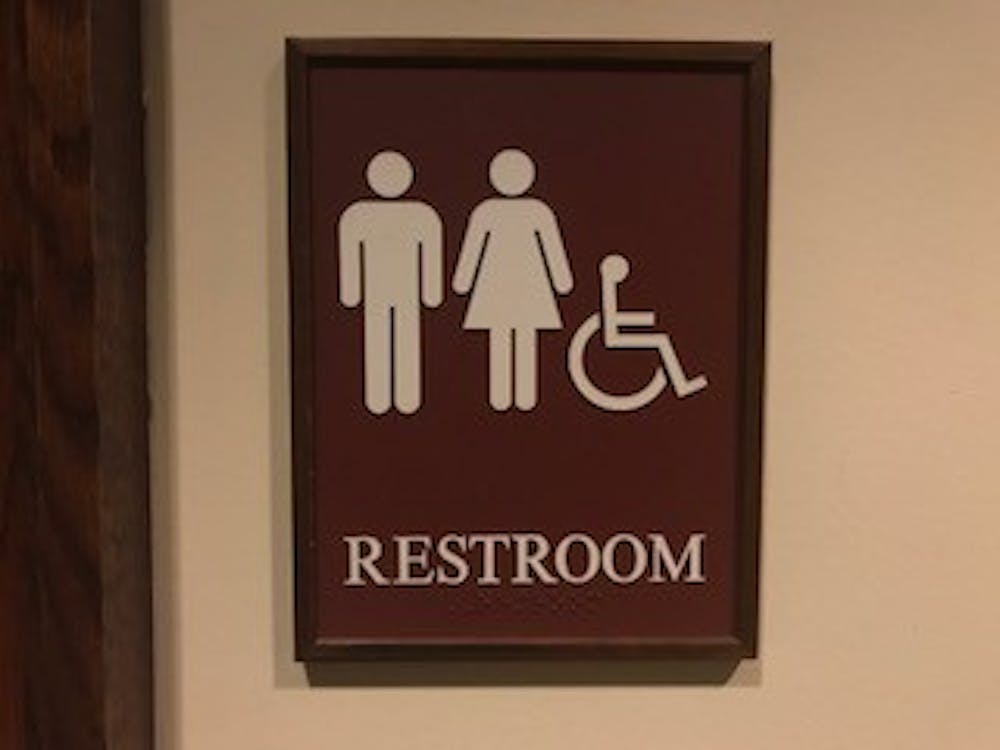Editor's note: The use of “they” as a personal pronoun in this story reflects the preferred pronoun of the student interviewed.
During the summer, 46 bathrooms on campus became visibly inclusive to all genders, largely because of the efforts of Canvas Brieva, a student activist who had been critically considering how the University of Richmond could make bathrooms less exclusive.
Brieva, a junior at UR, is a student leader of the Queer and Trans Advocacy Coalition (QTAC), a grassroots movement that focuses on creating inclusive policies on campus. Brieva said that they, along with a few other students, began thinking last fall about how traditional male and female restroom signs are not inclusive for all gender identities.
“Changing signs is a visible way of saying that you can identify differently on this campus,” Brieva said.
Brieva said that last spring they walked through buildings across campus cataloging how many single-stall lockable bathrooms there were in each building. Brieva then corresponded this summer with Lee Dyer, the associate director for LGBTQ campus life, via email to report how many single-stall bathrooms they had found.
“Before Lee got here, it was difficult because his position was empty,” Brieva said. “Not having a person who focused specifically on LGBT life meant students had to make a lot of the programming.”
Dyer, who started his position in May 2017, said that the university’s plan to install gender-inclusive restroom signs outside of single-stall bathrooms had been formed prior to his arrival at UR by the Trans Policy Review Board, which is made up of students, university staff members and Glyn Hughes, the director of Common Ground.
“The University of Richmond believes that individuals should use whatever restroom facility meets their individual needs,” according to UR's bathroom policy, which is listed on the Office of Common Ground's website. The website also provides a link to a Gender Inclusive Bathroom Guide, which lists the locations of all the gender-inclusive restrooms on campus.
Dyer said that upon his arrival to the university, he met with University Facilities to begin the process of installing signs that would make the single-stall lockable restrooms visibly inclusive to all genders.
“A lot of the time you’ll see a single-use restroom, and you don’t really know if it is inviting if you have a trans identity,” Dyer said. “We wanted to make it known that this would be inviting for trans-identifying individuals.”
According to the university’s Gender Inclusive Bathroom Guide, there are 46 all-gender restrooms across campus. Dyer said that the installation of the signs was funded by University Facilities, and that the university has been very progressive in intentionally making campus more inclusive.
“I think it’s one thing to have an office in Tyler Hanes where we work with these identities, but it’s another thing when you can go to any place on this campus and know that it's a safe space,” he said.
Enjoy what you're reading?
Signup for our newsletter
Kylie Britt, a junior and president of Students Creating Opportunities, Pride and Equality (SCOPE) said that she believes it is important for the university to continue making campus more inclusive.
“Gender drawings have symbolism and draw a binary system, which excludes people,” Britt said. “We don’t have a lot of spaces on campus that aren’t gendered.”
Britt added that SCOPE is working on encouraging UR faculty to introduce themselves with their personal pronouns, as well as developing projects to create more non-gendered spaces at UR.
The creation of all-gender restrooms on campus reflects national debates on transgender rights. On Oct. 20, Gov. Roy Cooper of North Carolina issued an executive order overturning the state’s HB2 law that prevented transgender identifying individuals from using government-run restrooms that correspond with their gender identity.
On Monday, a federal judge from the District of Columbia blocked the enforcement of President Trump’s military ban. The ban indefinitely prohibited transgender individuals from enlisting in the military and would have required the military to authorize the discharge of transgender service members by March 2018.
Dyer said that the installation of the all-gender restrooms signs in various buildings at UR is only the beginning of the university's steps toward making campus more welcoming for all genders.
“We want to make sure that we’re making this a comfortable environment for all students,” Dyer said. “I think this just makes a better university experience and allows you to focus on being a student.”
Dyer added that Common Ground plans to look at all-gender bathroom expansion for some multi-stall restrooms on campus, as well as the possible creation of a living-learning community for LGBTQ students.
Contact news writer Bri Park at brianna.park@richmond.edu.
Support independent student media
You can make a tax-deductible donation by clicking the button below, which takes you to our secure PayPal account. The page is set up to receive contributions in whatever amount you designate. We look forward to using the money we raise to further our mission of providing honest and accurate information to students, faculty, staff, alumni and others in the general public.
Donate Now



